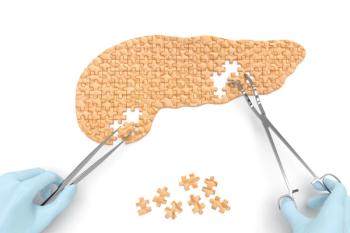
Personalized Survivorship Plans for Colon Cancer Patients Receiving Adjuvant Chemotherapy
Survivorship care for patients with colon cancer should include comprehensive coordination between oncologists, specialists, and primary care providers and include psychological and economic factors in addition to standard health recommendations.
Healthcare providers who care for colon cancer survivors should curate a personalized survivorship plan for patients that monitors cancer recurrence while also managing other long-term effects, according to a review published in Clinical Colorectal Cancer.1
Colon cancer remains one of the most commonly diagnosed cancers in the US, but the number of colon cancer survivors has increased in the last decade as a result of earlier detection and better treatment options. Many patients with stage III or high-risk stage II colon cancer also receive adjuvant chemotherapy to reduce the risk of cancer recurrence. A team of investigators from the University of Nebraska Medical Center conducted a review to assess the survivorship of patients with colon cancer and surveillance targeted to those who receive adjuvant chemotherapy.
In the timeline of surveillance after surgery or at the time of diagnosis, if surgery is not in the treatment plan, the National Comprehensive Cancer Network (NCCN) and the American Cancer Society (ACS) recommend that in years 1-2 a colonoscopy be performed in year 1; in years 3-5, a colonoscopy should be performed in year 4; and in 5 or more years, a colonoscopy should be performed every 5 years starting in year 9. Guidelines from the European Society for Medical Oncology recommend that colonoscopies should be performed every 3-5 years after the initial colonoscopy at year 1. The American Society of Clinical Oncology recommends colonoscopies every 5 years after the initial colonoscopy in year 1; however, they state that this is dictated by the findings of the previous colonoscopy. While all of these guidelines have slight variations, they all recommend increasing the frequency of colonoscopies, usually within 1 year, if adenomatous polyps are detected during surveillance.
“The optimal surveillance to prolong survival by early detection and treatment of colon cancer recurrences remain unclear, as clinical trial data has failed to provide a consistent answer,” the review authors wrote. The heterogeneity of clinical trials hinders a precise evaluation of the benefits of various surveillance strategies, which in turn, leads to slight differences in recommendations by different organizations.
With more than 60% of colon cancer recurrences within the first 2 years and more than 91% occurring within the first 5 years, intensive surveillance in the first 2-3 years with a discontinuation of surveillance after 5 years is recommended. Patients with a higher risk of recurrence should undergo more frequent testing, while those with significant comorbidities, limited life expectancy, or ineligible for future systemic therapy or surgery should avoid surveillance.
Managing physical effects related to cancer or treatment
Peripheral neuropathy is a common side effect of certain chemotherapy treatments, such as with oxaliplatin. Because of its dose-related toxicity, reducing the duration of oxaliplatin is effective in reducing the risk of neurotoxicity; however, coasting phenomenon, in which oxaliplatin-induced neuropathy exacerbates in the 2-3 months following discontinuation, may persist for months or years. It is essential to determine whether patients are predisposed to an increased risk of developing peripheral neuropathy such as in the case of patients with diabetes, alcoholism, or hereditary neuropathy. Despite the numerous studies assessing treatment options for chemotherapy-induced peripheral neuropathy, strong evidence for a standard treatment is lacking. The most robust available date suggests that duloxetine should be used at the treatment for chemotherapy-induced peripheral neuropathy; however, if discontinued, it must be tapered slowly to avoid withdrawal symptoms associated with serotonin-norepinephrine reuptake inhibitors.
Some colon cancer patients may require an ostomy, which can cause both physical and emotional stress, thereby reducing the patient’s quality of life. Loss of bowel movement control that typically presents with ostomies can lead to patient anxiety, depression, sexual dysfunction, and social isolation. Proper education, counselling, support, and resources by appropriate health care providers can help most survivors adapt successfully over time.
Patients may also experience gastrointestinal or urinary complications. While chemotherapy may disrupt the normal flora in the gut, gastrointestinal complications are often more frequent in patients who receive radiation therapy, low anterior resection, or lower surgical anastomoses, such as in rectal cancer. Patients with persistent or refractory symptoms may benefit from a gastroenterologist referral. Urinary complications, such as incontinence or retention, on the other hand, may be treated with anticholinergics, bladder training, and assessments from a urologist.
Other adverse events seen in colon cancer survivors include sleep disturbances and insomnia, fatigue, sexual dysfunction, and decreased fertility. Cognitive behavioral therapy for insomnia is a preferred and recommended treatment and pharmacological interventions should be considered only if nonpharmacological interventions have remained unsuccessful. Treatment for fatigue should include diagnostic testing to first rule out organ function and endocrine abnormalities. Physical activity, psychosocial interventions, and other nonpharmacological interventions are often recommended. If these remain unsuccessful, psychostimulants may be considered; however, significant benefits have not been widely proven in most studies. Historically, the number of colon cancer patients who have been treated in their reproductive years or who were not done with childbearing have been relatively small. Although studies have been limited in this population, more patients are being treated in their reproductive years with the rise in new colorectal cancer diagnoses in younger populations.
Managing psychological effects related to cancer or treatment
Anxiety, depression, and psychological distress are often increased in colon cancer survivors, and are typically even more elevated during chemotherapy. The review authors noted that in an investigation, 67% of survivors reported a fear of recurrence 1 year after diagnosis. Compared with the general population, patients with cancer have an increased 12-month prevalence rate for any mental disorder, including major depressive disorder or dysthymia. Screening tools such as the NCCN distress thermometer, the hospital anxiety and depression scale (HADS), the Patient Health Questionnaire (PHQ)-2 and PHQ9, and the Generalized Anxiety Disorder (GAD)-7 are all available to assess patient psychological distress. “Interventions to address psychological issues are crucial for improving overall health and quality of life in colon cancer survivors,” the authors added.
Cancer patients are often likely to develop cognitive and memory problems; however, although there is significant data to support this decline in cancer patients, there is no standard protocol in place to detect or treat cognitive complications in this patient population. Imaging studies may be helpful for those with focal neurological deficits but no treatments have been proven for the treatment of cognitive decline. “A trial of medications like methylphenidate, modafinil, [and] donepezil can be tried, but high-quality evidence to support the use of these medications in cancer survivors is lacking,” the authors wrote. Counselling, education, validation of patient cognitive dysfunction, and coping strategies, may all be beneficial and are encouraged.
Managing socioeconomic effects related to cancer or treatment
Other factors to consider are the management of non-health concerns such as the management of social and economic effects. Financial burden due to the large out-of-pocket expenses associated with medications, doctor visits, and hospital care can all add to the stresses in cancer survivors. In addition, patients with treatment-related complications are often at a higher risk for financial burden. Patients often avoid discussing financial burdens with their physicians. Returning to work and being able to function at work after cancer treatment is another burden the patients may struggle with. Implementing a financial health assessment into routine clinical assessments may help identify patients who need financial assistance earlier on. In addition, providing treatment recommendations that cater to specific work-related considerations, whenever applicable, may also help patients with expectations in duration and management of symptoms upon returning to work.
Lastly, promoting overall health such as physical activity, nutrition, weight loss (if applicable), smoking cessation, and screening for second primary cancer may all help to reduce comorbidities and future possible events in patients.
“The survivorship care plan should not only be clearly explained to the patient but also made available to all the physicians involved in their long-term care, including primary and specialty care,” the investigators noted.
“The key to optimal care lies in comprehensive coordination among oncologists, primary care providers, and specialists, with clearly defined roles.”
“Further research is needed to improve survivorship guidelines and cancer care delivery,” they concluded.
Reference
1. Kesireddy M, Tenner L. Colon cancer survivorship in patients who have received adjuvant chemotherapy. Clin Colorectal Cancer. Published online July 28, 2023. doi:10.1016/j.clcc.2023.07.001
Newsletter
Pharmacy practice is always changing. Stay ahead of the curve with the Drug Topics newsletter and get the latest drug information, industry trends, and patient care tips.























